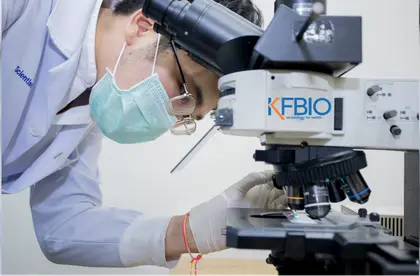Earlier this autumn, Ukraine received AI-driven equipment for scanning and processing histological preparations, which will allow for earlier detection of tumors.
The equipment is produced by Chinese high-tech “smart pathology” company KfBio, according to a report by the RBC-Ukraine news outlet. The AI technology is based on a neural network that is able to analyze histological images and automatically identify affected and suspicious cells.
JOIN US ON TELEGRAM
Follow our coverage of the war on the @Kyivpost_official.
The lion’s share of all successful cases of cancer treatment is timely detection of malignancies, followed by correct diagnosis and monitoring of the course of the disease.
Since AI capabilities allow for analyzing about 1,500 clinical cases per day, it is expected that this will increase the efficiency of diagnosis more than 50-fold.
According to the National Cancer Register of Ukraine, every year about 140,000 Ukrainians learn about the diagnosis of cancer, 63,000 of them (45%) die. In other words, every day cancer takes the lives of 167 Ukrainians.
The new AI technology will become available as part of a national program for the introduction of digital cancer diagnostic technology.
AI will digitize the samples and integrate them into the National Library of images, which will facilitate the work of pathologists.
In addition, the existing library of more than 43,000 samples will allow AI to analyze images, which in turn will help doctors make diagnoses as accurately as possible.

Dutch Good Growth Fund Becomes a Shareholder of Bank Lviv
More than 100 digital scanners will be installed in medical institutions and laboratories throughout Ukraine for this purpose.
The new technology can also be used in veterinary medicine to diagnose animals.
The program was initiated and implemented by a team of doctors, developers and engineers led by Tygran Amalyan, a Ukrainian medical innovator and founder of the COR-Medical equipment distribution platform.
“We plan to implement a national program for the introduction of digital cancer diagnostic technology in all regions of Ukraine within five years,” says Amalyan.
In the first stage, 10 scanners will be installed and 30 specialists will be trained within a year.
These scanners will become part of the COR-Medical platform, with a mobile application that will connect patients, doctors and the medical industry into a single system.
“It will allow cancer patients in Ukraine, immediately after the diagnosis is established by a doctor, to receive it in a matter of minutes along with the scans themselves in their smartphone and, if desired, send it to another doctor anywhere in the world for a second opinion,” Amalyan added.
The cost of each scanner with digital storage and infrastructure is about Hr.7.5 million ($193,000).
The first two digital scanners purchased with charitable contributions have already arrived in Ukraine and are undergoing the adjustment and installation stage. They will be installed in leading Ukrainian medical and diagnostic institutions.
You can also highlight the text and press Ctrl + Enter






